西方文化导论Unit3
- 格式:ppt
- 大小:1.32 MB
- 文档页数:11
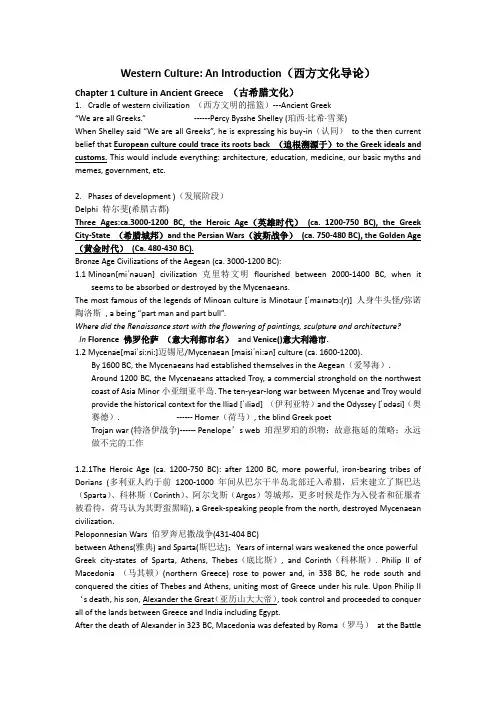
Western Culture: An Introduction(西方文化导论)Chapter 1 Culture in Ancient Greece (古希腊文化)1.Cradle of western civilization (西方文明的摇篮)---Ancient Greek“We are all Greeks.”------Percy Bysshe Shelley (珀西·比希·雪莱)When Shelley said “We are all Greeks”, he is expressing his buy-in(认同)to the then current belief that European culture could trace its roots back (追根溯源于)to the Greek ideals and customs. This would include everything: architecture, education, medicine, our basic myths and memes, government, etc.2.Phases of development )(发展阶段)Delphi 特尔斐(希腊古都)Three Ages:ca.3000-1200 BC, the Heroic Age(英雄时代)(ca. 1200-750 BC), the Greek City-State (希腊城邦)and the Persian Wars(波斯战争)(ca. 750-480 BC), the Golden Age (黄金时代)(Ca. 480-430 BC).Bronze Age Civilizations of the Aegean (ca. 3000-1200 BC):1.1Minoan[miˈnəuən] civilization 克里特文明flourished between 2000-1400 BC, when itseems to be absorbed or destroyed by the Mycenaeans.The most famous of the leg ends of Minoan culture is Minotaur [ˈmaɪnətɔ:(r)] 人身牛头怪/弥诺陶洛斯, a being “part man and part bull”.Where did the Renaissance start with the flowering of paintings, sculpture and architecture?In Florence 佛罗伦萨(意大利都市名)and Venice()意大利港市.1.2Mycenae[maiˈsi:ni:]迈锡尼/Mycenaean [maisiˈni:ən] culture (ca. 1600-1200).By 1600 BC, the Mycenaeans had established themselves in the Aegean(爱琴海).Around 1200 BC, the Mycenaeans attacked Troy, a commercial stronghold on the northwest coast of Asia Minor小亚细亚半岛. The ten-year-long war between Mycenae and Troy would provide the historical context for the Iliad [ˈɪliəd] (伊利亚特)and the Odyssey [ˈɒdəsi](奥赛德). ------ Homer(荷马), the blind Greek poetTrojan war (特洛伊战争)------ Penelope’s web 珀涅罗珀的织物;故意拖延的策略;永远做不完的工作1.2.1The Heroic Age (ca. 1200-750 BC): after 1200 BC, more powerful, iron-bearing tribes of Dorians (多利亚人约于前1200-1000年间从巴尔干半岛北部迁入希腊,后来建立了斯巴达(Sparta)、科林斯(Corinth)、阿尔戈斯(Argos)等城邦,更多时候是作为入侵者和征服者被看待,荷马认为其野蛮黑暗), a Greek-speaking people from the north, destroyed Mycenaean civilization.Peloponnesian Wars 伯罗奔尼撒战争(431-404 BC)between Athens(雅典) and Sparta(斯巴达);Years of internal wars weakened the once powerful Greek city-states of Sparta, Athens, Thebes(底比斯), and Corinth(科林斯). Philip II of Macedonia (马其顿)(northern Greece) rose to power and, in 338 BC, he rode south and conquered the cities of Thebes and Athens, uniting most of Greece under his rule. Upon Philip II ‘s death, his son, Alexander the Great(亚历山大大帝), took control and proceeded to conquer all of the lands between Greece and India including Egypt.After the death of Alexander in 323 BC, Macedonia was defeated by Roma(罗马)at the Battleof Cynoscephalae(基诺斯山战役)in 197 BC and then again at the Battle of Pydna(皮德纳战役)in 168 BC. The Greeks were finally defeated at the Battle of Corinth in 146 BC. Rome completely destroyed and plundered(掠夺)the city of Corinth as an example to other Greek cities.1.2.2The Greek City-State and the Persian Wars (ca. 750-480 BC)In 490 BC, Battle of Marathon 马拉松战役In 480 BC, Battle of the Hot Gates and Battle of Salamis 萨拉米斯海战Persian Wars(希波战争): Herodotus 希罗多德(ca. 485-425 BC), the father of history 历史之父。
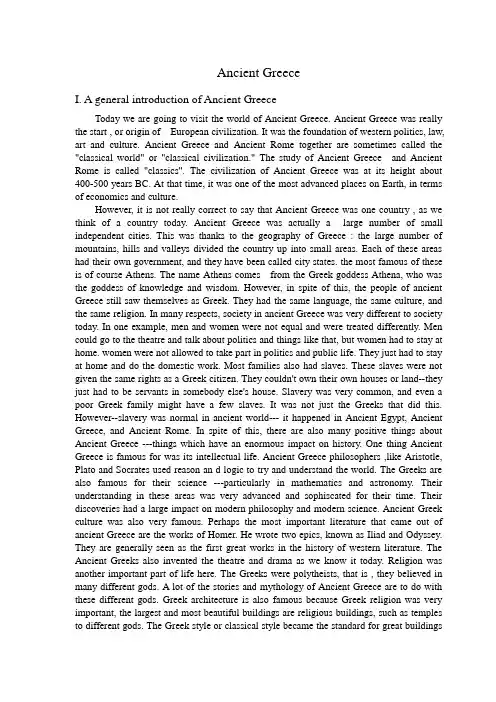
Ancient GreeceI. A general introduction of Ancient GreeceToday we are going to visit the world of Ancient Greece. Ancient Greece was really the start , or origin of European civilization. It was the foundation of western politics, law, art and culture. Ancient Greece and Ancient Rome together are sometimes called the "classical world" or "classical civilization." The study of Ancient Greece and Ancient Rome is called "classics". The civilization of Ancient Greece was at its height about 400-500 years BC. At that time, it was one of the most advanced places on Earth, in terms of economics and culture.However, it is not really correct to say that Ancient Greece was one country , as we think of a country today. Ancient Greece was actually a large number of small independent cities. This was thanks to the geography of Greece : the large number of mountains, hills and valleys divided the country up into small areas. Each of these areas had their own government, and they have been called city states. the most famous of these is of course Athens. The name Athens comes from the Greek goddess Athena, who was the goddess of knowledge and wisdom. However, in spite of this, the people of ancient Greece still saw themselves as Greek. They had the same language, the same culture, and the same religion. In many respects, society in ancient Greece was very different to society today. In one example, men and women were not equal and were treated differently. Men could go to the theatre and talk about politics and things like that, but women had to stay at home. women were not allowed to take part in politics and public life. They just had to stay at home and do the domestic work. Most families also had slaves. These slaves were not given the same rights as a Greek citizen. They couldn't own their own houses or land--they just had to be servants in somebody else's house. Slavery was very common, and even a poor Greek family might have a few slaves. It was not just the Greeks that did this. However--slavery was normal in ancient world--- it happened in Ancient Egypt, Ancient Greece, and Ancient Rome. In spite of this, there are also many positive things about Ancient Greece ---things which have an enormous impact on history. One thing Ancient Greece is famous for was its intellectual life. Ancient Greece philosophers ,like Aristotle, Plato and Socrates used reason an d logic to try and understand the world. The Greeks are also famous for their science ---particularly in mathematics and astronomy. Their understanding in these areas was very advanced and sophiscated for their time. Their discoveries had a large impact on modern philosophy and modern science. Ancient Greek culture was also very famous. Perhaps the most important literature that came out of ancient Greece are the works of Homer. He wrote two epics, known as Iliad and Odyssey. They are generally seen as the first great works in the history of western literature. The Ancient Greeks also invented the theatre and drama as we know it today. Religion was another important part of life here. The Greeks were polytheists, that is , they believed in many different gods. A lot of the stories and mythology of Ancient Greece are to do with these different gods. Greek architecture is also famous because Greek religion was very important, the largest and most beautiful buildings are religious buildings, such as temples to different gods. The Greek style or classical style became the standard for great buildingsin Europe and it still is today. Many famous buildings in Europe and America are built in this style---including the White House. Another legacy from Ancient Greece was the sport. The Greeks invented the sports competitions to honor their gods. The most famous of these was held every four years in a place called Olympia. It is from this we get the Olympics. From politics to culture, from architecture to sport, Ancient Greece's influence on later European civilization has been extremely important.Outline:Ancient Greece was really the start or origin of western civilization.Geography: mountainousPolitics: city-states/ poleisslave-based democracy politicsPhilosophy: philosophers like Socrates, Plato, and AristotleScience: mathematics, astronomyA polis or city state is state made up of a city and its surrounding countryside and townsLiterature: epics ( Iliad and Odyssey), poetry, and dramaReligion: polytheists, mythologyArchitecture: standard styleSport: OlympicsII. Learning objectives●To get a brief view of the history and development of Greek Civilization●To be familiar with Greek culture in mythology, religion, philosophy, history, literature and arts●To know some representative philosophers and their contributionsIII. Word studyNeolithic ['niə'lɪθɪk] adj. [古] 新石器时代的;早先的Cretan [‘kritən] n. 克里特岛人adj. 克利特岛的Mycenean civilisation 迈锡尼文明Thessaly[‘θesəli] n. 塞萨利(希腊地名)Trojan [‘trodʒən] adj. 特洛伊的;特洛伊人的Iliad英[‘iliəd] n. 伊里亚特(相传为荷马所做的古希腊史诗)Odyssey英美 ['ɑdəsi] n. 奥德赛(古希腊史诗)Ajax ['eidʒæks ]n.【希腊神话】(亦作Ajax Telamon] /'teləmən/,Great Ajax(大)埃阿斯(特洛伊围攻战中的希腊英雄,骁勇和膂力仅次于阿喀琉斯。
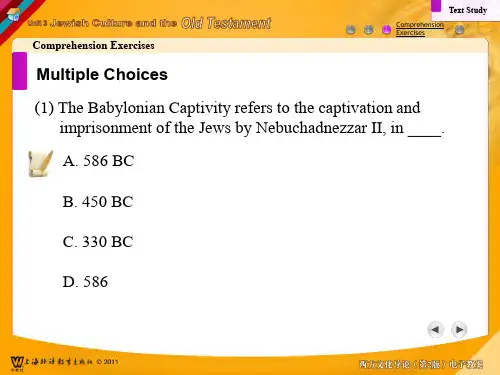
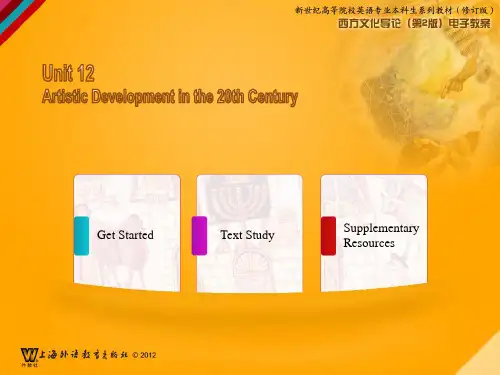
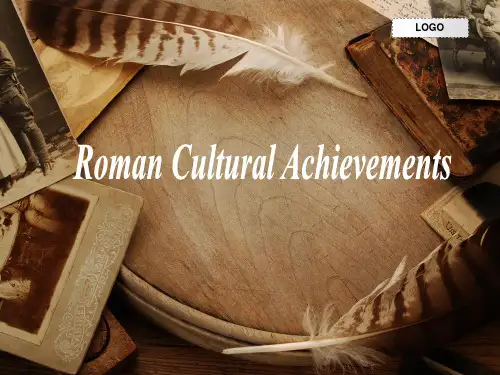
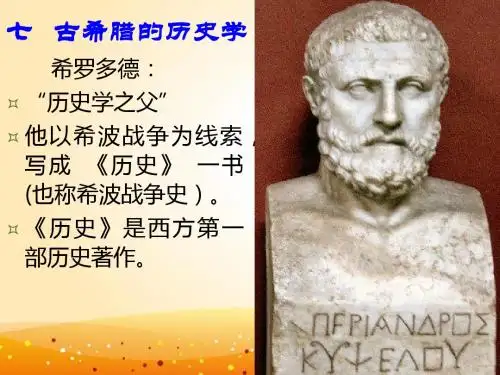
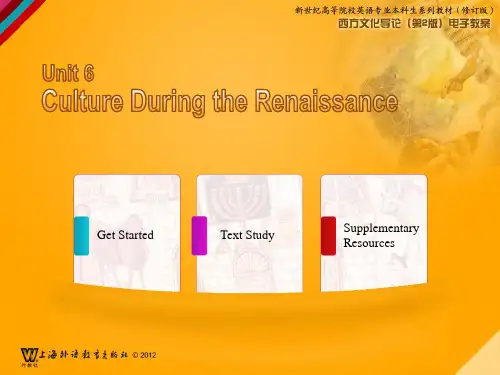
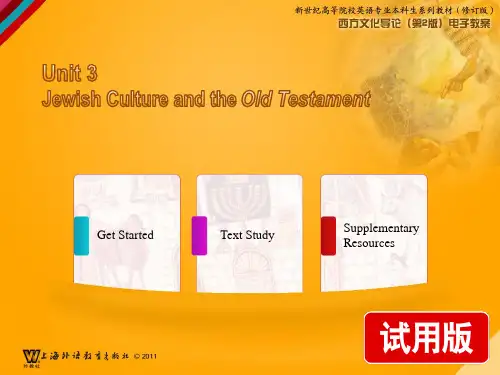
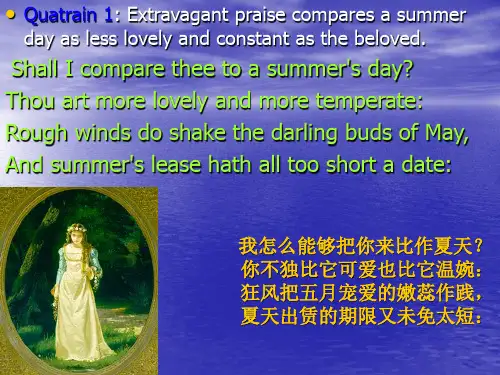

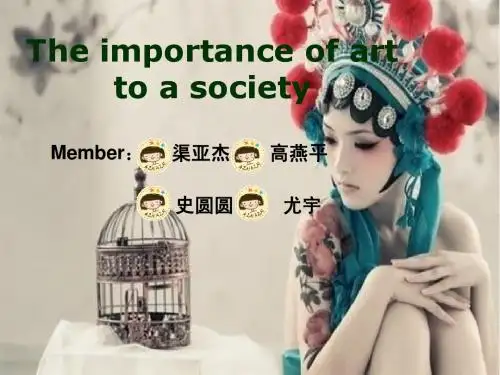
Greek CultureI. Fill in the blanks:1.European culture is made up of many elements, two of these elements are considered to be more enduring and they are the Greco-Roman(希腊罗马的)element and the Judeo-Christian (犹太教与基督教的)element.2.Greek culture reached a high point of development in the 5th century.3.In the second half of the 4th century B. C., all Greece was brought under the rule of Alexander, king of Macedon.4.In 146 B. C. the Romans conquered Greece.5.Revived in 1896, the Olympic Games have become the world’s foremost amateur sports competition.6.Ancient Greeks considered Homer to be the author of their epics.7.The Homer's epics consisted of_ Iliad and Odyssey .8.The Iliad deals with the alliance of the states of the southern mainland of Greece, led by Agamemnon in their war against the city of Troy.9.The Odyssey deals with the return of Odysseus after the Trojan war to his home, island of Ithaca.10.The representation form of Greek Democracy is __ citizen-assembly._(公民大会)11.Of the many lyric poets of ancient Greece, two are still admired by readers today: Sappho and Pindar.12.Sappho was considered the most important lyric poet of ancient Greece.13.Pindar is best known for his odes celebrating the victories at the athletic games, such as the 14 Olympic odes.14.The three great tragic dramatists of ancient Greece are Aeschylus, Sophocles, and Euripides.15.Aeschylus wrote such plays as Prometheus Bound, Persians and Agamemnon.16.Sophocles wrote such tragic plays as Oedipus the King(俄狄浦斯王), Electra(伊莱克特拉(谋杀其母及其情人者), and Antigone.Oedipus complex(恋母情结)and Electra complex(恋父情结) derived from Sophocles’ plays.17.Euripides(欧里庇得斯)wrote mainly about women in such plays as Andromache, Media, and Trojan Women.edy also flourished in the 5th century B. C.. Its best writer was Aristophanes, who has left eleven plays, including Frogs, Clouds,Wasps and Birds.19.Euripides _ is the first writer of "problem plays".20.Herodotus(希罗多德)is often called “Father of History”. He wrote about the wars between Greeks and Persians.21.Thucydides(修西得底斯)described the war between Athens and Sparta and between Athens and Syracuse, a Greek state on the Island ofSicily.22.Pythagoras(毕达哥拉斯)was a bold thinker who had the idea that all things were numbers.23.Pythagoras was the founder of scientific mathematics.24.Heracleitus(赫拉克利特) believed fire to the primary element of the universe, out of which everything else had arisen.25.The greatest names in European philosophy are Socrates, Plato and Aristotle.26.In the 4th century B. C., four schools of philosophers often argued with each other, they are the Cynics(犬儒学派), the Sceptics(怀疑论学派), the Epicureans(伊壁鸠鲁学派), and the Stoics(斯多葛学派).27.Euclid(欧几里得) is well-known for his Elements《几何原本》, a textbook of geometry.28.To illustrate the principle of the level, Archimedes is said to have told the king: “Give me a place to stand, and I will move the world.”29.Greek architecture can be grouped into three styles: the Doric(多利安式)style which is also called the masculine style; the Ionic(爱奥尼亚式)style which is also called the feminine style; and a later style that is called the Corinthian(科林斯式)style.30.The Acropolis at Athens(雅典卫城)and the Parthenon(万神殿) are the finest monument of Greek architecture and sculpture in more than2000 years.II.Choice1.Which culture reached a high point of development in the 5th century B. C.?A. Greek CultureB. Roman CultureC. Egyptian CultureD. Chinese Culture2.In ___________ the Roman conquered Greece.A.1200B.C. B.700 B. C.C.146 B. C.D. The 5th century3.Which of the following works described the war led by Agamemnon against the city of Troy?A. Oedipus the KingB. IliadC. OdysseyD. Antigone4.Which of the following is NOT the plays written by Aeschylus?A. AntigoneB. AgamemnonC. PersiansD. Prometheus Bound5.Which of the following is NOT the plays written by Sophocles?A.ElectraB.AntigoneC.Trojan WomanD.Oedipus the King6.Which of the following is the play written by Euripides?A.Antigone B PersiansC ElectraD Medea7.Which of the following is NOT the greatest tragic dramatist of ancient Greece?A AristophanesB EuripidesC SophoclesD Aeschylus8.Who ever said that “You can not step twice into the same river”?A PythagorasB HeracleitusC Aristotle9.Who was the founder of scientific mathematics?A HeracleitusB AristotleC SocratesD Pythagoras10.Who is chiefly noted for his doctrine that “man is the measure of all things”?A ProtagorasB PythagorasC PyrrhonD EpicurusIII. Interpretation:1. PlatoPlato was a very famous philosopher of ancient Greece, pupil of Socrates. Plato built up a comprehensive system of philosophy. He argued that men have knowledge because of the existence of certain general “ideas”, like beauty, truth and goodness. Only these “ideas” are completely real, while the physical world is only relatively real. For this reason, Plato’s philosophy is called Idealism, an d Plato was called idealist.2. "Democracy" in ancient Greece1)Democracy means "exercise of power by the whole people", but in Greece by "the whole people" the Greeks meant only the adult male citizens.2) Women, children, foreigners and slaves were excluded from Democracy.IV. Questions:1. How did the Greek Culture originate and develop?1) Probably around 1200 B.C., a war was fought between Greece and troy. This is the war that Homer refers to in his epics.2) Greek culture reached a high point of development in the 5th century B.C.A. The successful repulse(击退)of the Persian invasion early in the 5th century.B. The establishment of democracy.C. The flourishing of science, philosophy, literature, art and historical writing in Athens.3) The 5th century closed with civil war between Athens and Sparta.4) In the second half of the 4th century B.C., Greece was conquered by Alexander, king of Macedon. Whenever he went and conquered, whenever Greek culture was found.5) Melting between Greek culture and Roman culture in 146 B.C., the Romans conquered Greece.2. What is the great significance of Greek Culture on the later-on cultural development?There has been an enduring excitement about classical Greek culture in Europe and elsewhere rediscovery of Greek culture played a vital part in the Renaissance in Italy and other European countries.1) Spirit of innovationThe Greek people invented mathematics and science and philosophy; They first wrote history as opposed to mere annals; They speculated freely about the nature of the world and the ends of life, without being bound in the fetters(束缚) of any inherited orthodoxy(正统的实践活动、风俗或信仰).2) Supreme AchievementThe Greeks achieved supreme achievements in nearly all fields of human endeavor: Philosophy, science, epic poetry, comedy, historical writing, architecture, etc.3) Lasting effectA. Countless writers have quoted, borrowed from and otherwise used Homer's epics, the tragedies of Aeschylus and Sophocles and Euripides, Aristophanes' comedies, Plato's Dialogues, ect.B. In the early part of the 19th century, in England alone, three young Romantic poets expressed their admiration of Greek culture in works which have themselves become classics: Byron(拜伦)'s Isles of Greece(《哀希腊》), Shelley(雪莱)'s Hellas and Prometheus Unbound (《解放了的普罗米修斯》)and Keats(济慈)'s Ode on a Grecian Urn(《希腊古瓮》).C. In the 20th century, there are Homeric parallels in the Irishman James Joyce(乔伊斯)'s modernist masterpiece Ulysses.Roman Culture 1I. Fill in the blanks.1. The burning of Corinth in 146 B. C. marked Roman conquest of Greece, which was then reduced to a province of the Roman Empire.2. The Roman writer Horace said: “Captive Greece took her rude conqueror captive”.(大意是:征服者反而被被征服者所征服。
Unit 3 Jewish culture and the Old TestamentI Translate the following words or phrases into ChineseBabylonian Assyrian Tigris and Euphrates Rivers Jerusalem celestial temples rabbis the Babylonian Captivity Macedonian king the Diaspora Torah Mishna Talmud Jewish Enlightenment Hebrew Pentateuch Yiddish Zionist movements Judaism the Holocaust Messiah prophet Ezekiel Pentateuch GenesisExodus Leviticus Prophets Hagiogra-pha & Apocrypha NehemiasII Fill in the blanks1.lt is said that Jews belong to the ______race. They claim to be descended from_______,and have emigrated from _______ and to have settled in the ______ century BC in north Egypt, then entered ______in the 12th century BC and ultimately settled on both sides of_______.2. During1040-1012 BC,_____became the first king of the unified nation built up by the Jews. After his death, in 1012 BC – 972 BC,______ declared the founding of a unified Israel country and made_____ the capital. His son _______(972-932 BC)became the king of Israel and built imperial palaces and _______.3.During _______BC, the kingdom was divided into two kingdoms: the Northern kingdom of_____ and the Southern kingdom of ______.4. In _____,the ________sacked Jerusalem (Assyrian Captivity), and Israel was ruined. In 586 BC, ________attacked Judah, and then Judah and Israel were non-existent as independent countries.5.In 538 BC,the Persian king _______allowed the Jews to go back to rebuild Jerusalem after he had defeated Babylonia.6.In 333 BC,the Macedonian king _______took Jerusalem and started to Hellenize the Jewish people .In______, the Roman Empire took control of Judea and Israel. The Jews could not bear the Romans’ cruelty and revolted against Romans. They were ______in large numbers and the rest were taken as slaves. Only a minority of the population escaped to go elsewhere in the world.7.Much of Jewish culture was safeguarded and well preserved by exiled Jews. They collected and systematically recomposed the scattered legends and manuscripts into the______ and the______ before they compiled finally the _______,, a multi-volume encyclopedia of Jewish religion.8. In the 20th century, about ________Jews were murdered by Hitler during the Second World War. On _______, the United Nations declared the founding of the Jewish nation of Israel.9. Jewish literature falls into _____historical phases. The early period (200 BC–100 AD)includes_______, ______and _______ literatures. Medieval Literature (100 – 18th century)is ______in essence, made up of _______or the descriptions of _______and its ritual ceremonies. Modern Jewish literature can be classified into two groups:___________.10.Most of Jewish historical and religious documents were written in_______.Modern Hebrew literature has passed _______stages in its development.The first stage centred round______ and was featured with the revival of ________and Jewish traditional culture. The second stage focused on____________.11._______is worshipped as the chief god of the country of Israel.______helped Jewish people spread the religion of Judaism and finally confirmed it during the Babylonian Captivity and later period.The core of Judaism is Moses’______and______.III Explain the following termsJewish Enlightenment ,Moses’ Ten Commandments;IV Please introduce major Jewish FestivalsV Introduce the Old TestamentAnswers:1.Semitic; Abraham; Mesopotamia; 16th ;Canaan; the Jordan River2. Saul; King David; Jerusalem; Solomon; celestial temples3. 932-914; Israel; Judah4.722 BC; Assyrian King; Babylonia King5. Cyrus the Great6. Alexander the Great; 63 BC; slaughtered7. Torah; Mishna; Talmud8. six million; May 14, 19489. Three; classical; historical; Talmud; religious; Biblical notations; Jewish theology; Yiddish and Hebrew 10. Hebrew; three; Europe; Jewish national dignity; the establishment of Israel as a modern state; 11.Johovah; Ezekiel; Ten Commandments; the rabbis' interpretations of the prophet's doctrinesIII Explain the following termsJewish Enlightenment (The Haskalah) 犹太启蒙运动: It refers to an intellectual movement in Europe in the late 18th century. It encouraged Jews to borrow enlightenment values, learn secular knowledge, Hebrew, and Jewish history and assimilate into European society. It ultimately resulted in both the Reform and Zionist movements.。
西方文化导论一、概念题1. Da Vinci :Leonardo di serPieroDa Vinc i was an Italian Renaissance polymath: painter, sculptor, architect, musician, scientist, mathematician, engineer, inventor, anatomist, geologist, cartographer, botanist and writer. Leonardo has often been described as the archetype of the Renaissance Man, a man of "unquenchable curiosity" and "feverishly inventive imagination". He is widely considered to be one of the greatest painters of all time and perhaps the most diversely talented person ever to have lived. According to art historian Helen Gardner, the scope and depth of his interests were without precedent and "his mind and personality seem to us superhuman, the man himself mysterious and remote". Marco Rosci points out, however, that while there is much speculation about Leonardo, his vision of the world is essentially logical rather than mysterious, and that the empirical methods he employed were unusual for his time.2. Shakespeare:William Shakespeare was an English poet and playwright, widely regarded as the greatest writer in the English language and the world's pre-eminent dramatist. He is often called England's national poet and the "Bard of Avon". His surviving works, including some collaboration, consist of about 38 plays, 154 sonnets, two long narrative poems, and several other poems. His plays have been translated into every major living language and are performed more often than those of any other playwright.3. black humor :The definition of black humor is problematic; it has been argued that it corresponds to the earlier concept of gallows humor; and that, as humor has been definedsince Freud as a comedic act that anesthetizes an emotion, all humor is "black humor," and that there is no such thing as "non-black humor".二、填空题1.Pindar is best known for his odes celebrating the victories at the athletic games, such as the 14 Olympic odes.2. The three great tragic dramatists of ancient Greece are Aeschylus, Sophocles, and Euripides.3. Aeschylus wrote such plays as Prometheus Bound, Persians and Bound Agamemnon.4. Euripides(欧里庇得斯)wrote mainly about women in such plays as Andromache, Medea, and Trojan Women.5. Comedy also flourished in the 5th century B. C. Its best writer was Aristophanes, who has left eleven plays, including Frogs, Clouds, Wasps and Birds.6. Euripides _ is the first writer of "problem plays".7. Herodotus(希罗多德)is often called “Father of History”. He wrote about the wars between Greeks and Persians.8. Thucydides(修西得底斯)described the war between Athens and Sparta and between Athens and Syracuse, a Greek state on the Island of Sicily.9. Pythagoras(毕达哥拉斯)was a bold thinker who had the idea that all things were numbers.10. Pythagoras was the founder of scientific mathematics.11. She-wolf is the statue which illustrates the legend of Shecreation of Roman.12. The dividing range in the Roman history refers to 27 B.C.13. “I came, I saw, I conquered.” is said by Julius Caesar.14. Jesus went with his disciples to Jerusalem for the Passover, but was betrayed by Judas.15. In 313 the Edict of Milan( 米兰敕令) was issued by Constantine I and granted religious freedom to all and made Christianity legal.16. In 392 A.D, Emperor Theodosius made Christianity the official religions of the empire and outlawed all other religions.17. Charlemagne, who temporarily restored order in western and central Europe, was perhaps the most important figure of the medieval period. Romans”18. Charlemagne was crowed “Emperor of the Romans” by the Pope Emperor in 800.19. The Summa Theologica 《神学大全》by St. Thomas Aquinas (forms an enormous system and sums up all the knowledge of medieval theology.20. In 18th-century England, two writers must be mentioned as far as the periodical essay is concerned: Addison and Steele.21. Both Addison and Steele contributed to The Tatler and The Spectator, two series of periodical essays.22. In 1492 Moors(摩尔人)that had ruled Spain for four centuries were driven out from their last stronghold.23. In 1492 Columbus discovered American and claimed America for Spain.24. The most important contributions to the musical world by Beethoven were in those musical forms associated with the Beethoven growth of the sonata).25. Swan Lake was composed by Tchaikovsky.三、选择题1. Where did the Renaissance start with the flowering of paintings, sculpture and architecture?A. in Greece and RomeB. in Florence and VeniceC. in Milan and FlorenceD. in Italy and Germany2. When did the Renaissance reach its height with its center moving to Milan, then to Rome, and created High Renaissance?A. in the 11th centuryB. in the 15th centuryC. in the 16th centuryD. in the 17th century3. Which of the following works is written by Boccaccio?A. DecameronB. CanzoniersC. DavidD. Moses4. Which of the following High Renaissance artists is the father of the modern mode of painting?A. RaphaelB. TitianC. da VinciD. Michelangelo5. Which of the following High Renaissance artists was best known for his Madonna (Virgin Mary)?A. TitianB. da VinciC. MichelangeloD. Raphael6. Who took up the translation of the Bible into English for the first time?A. Jan HusB. John WyliffC. Martin LutherD. John Calvin9. Who is the author Institutes of the Christian Religion?A. John WycliffB. Jan HusC. John CalvinD. Erasmus11. Which of th e following was crowned “Emperor of the Romans” by the Pope in 800?A. St. Thomas AquinasB. CharlemagneC. ConstantineD. King James12. Who was the ruler of the Anglo-Saxon kingdom of Wessex and contributed greatly to the medieval European culture?A. Charles IB. Constantine IC. Alfred the GreatD. Charles the Great13. Does Song of Roland belong to which country’s epic?A. EnglishB. GermanicC. HebrewD. French14. Who is the author of the Opus Maius(《新工具论》)?A. Roger BaconB. Dante AlighieriC. ChaucerD. St. Thomas Aquinas15. Which of the following is NOT the greatest tragic dramatist of ancient Greece?A. AristophanesB.EuripidesC. SophoclesD. Aeschylus。
(1) Give a brief account of the major achievements of Greek culture, such as those in religion, philosophy, literature and science.Greek religion really took shape during the Homeric Age and featured polytheism with gods taking human form and feeling. Greek religion made a great contribution to Greek literature, philosophy and art. It is an important origin of Greek mythology which was fully developed by the religious tales of the Homeric epic and thus affected the later development of all kinds of Greek culture.Greek philosophy started with Thales (640 BC–547 BC) who believed that the material world originated in water. His philosophy was materialism. He was followed by Pythagoras who assumed that the key to the understanding of the world is numbers, on the opposition of the spokesman for idealism.The core Greek philosophers are Socrates, Plato and Aristotle. Socrates had scant regard for material wealth, but was keen on probing into the definition of some ethical and behavioral issues, such as “friendship” and “courage”.Plato established the Academy - the first Greek institution of higher learning. His contributions included his theory of ideas and his arguments on “republic” which was supposed to embrace his ideals about a future state where humans could enjoy a happy life. Aristotle is also a learned man and his work covers wide-ranging areas. His reputation as a philosopher largely depends on his argument on metaphysics which he tried to achieve a compromise between matter and divinity. Literary representation centred round the two epic poems of the Iliad and the Odyssey, lyrical poetry by Sappho and Pindar and drama by Aeschylus, Euripides and Aristophanes. Their works combined Greek myths and social life and won much appreciation and enthusiasm from the public.In science the mathematician Euclid established plane geometry and Archimedes discovered the ratio of radius of a circle and the relationship between the volume and surface of a sphere.(2) What do you think of the influence Greek culture has exerted on Western civilization as a whole? Give examples.Greek culture is often termed the cradle of the Western civilization and has had an enormous impact on Western culture. The specific contributions are found in the areas of philosophy, politics, literature, art, science and architecture.Greek politics was one of the greatest influences on the Western civilization. The Greeks were the first to successfully create a government based on the consensus of the people and thus provided a foundation for Western democracy.The second significant influence was that of philosophy. The Socratic idea about ethics and knowledge helped the Westerners care more for the effect of knowledge and value of morality, both of which give sound guidance to people in the later years to improve and change the world outside themselves, i.e., human society and the natural world.Later generations of Westerners have benefited a lot from Greek culture, such as those in painting, sculpture, architecture, drama, poetry and historical works. Classicism had Greek culture as one of the crucial sources, and this has helped Westerners so much that they ascribed the origin of the Renaissance to it. This changed the intellectual conditions of the later medieval period and opened the way to the modern era in the West.Chapter 21. Tell briefly the major characteristics and contributions of Roman culture, as are demonstrated in religion, poetry, history and architecture.In the early period, Roman culture often depended heavily on the introduction and imitation of other cultures, particularly, Greek culture. Thus Romans created their own powerful culture, laying the foundation for subsequent Western culture in many fields. According to Greek culturecreated d their own gods and myth, In poetry, ancient Rome made and others’ culture; they createbrilliant achievements,Livy was responsible for the great History of Rome in 142 volumes. His work has always been cited by later statesmen, writers or scholars,The architecture of Ancient Rome adopted the Greek style for its own purposes, but the Romans also developed a new kind.2. In what sense do you think Roman culture owed its accomplishments to the benefits obtained from Greek culture? Give examples.Roman culture learned and inherited a lot from Greek culture.,religion, philosophy and literature. In religion, Rome had its own system of beliefs which had been simple and could hardly compare with the plurality of Greek religion. The same is true of Roman philosophy where we could find examples ,In literature, Roman men of letters also borrowed a All in all, the two cultures are closely linkedgreat deal from Greek culture.Chapter 31. How was the Jewish civilization developed after a tortuous history of split and unification? The major explanation for the development of the Jewish civilization is its strong cohesiveness and vitality,they put into effect their Judaist beliefs and what they read of Judaist scriptures. From then on Jews have begun to become aware of the necessicity to liberate themselves from the restrictive laws and acquire new knowledge and modern ideas from the Europeans, Most of Jews thus received a good education, fully armed with cultural and scientific knowledge and did well in their own position they could quickly turn it into a well developed nation in spite of its small size and small population .2.Say something about Judaism and The Old Testament.The Old Testament is the Judaist Bible. It was written in Hebrew, including the three parts:Pentateuch, Prophets and Hagiographa and Apocrypha. After The Old Testament was translated into Greek by Jewish scholars,many westerners began to understand Judaism by reading this book. It is not only of religious value but also of literatry value.Chapter 41. What are the main components of Christianity and why could it be accepted as the official religion first by the Roman Empire and then by the following kingdoms or empires in Europe?(1)The main components of Christianity are :1) The Bible as the only Christian scripture; Major Christian doctrines about Trinity and Redemption;3) Other doctrines or events of Christianity:(2 )Christianity is accepted and popular in Europe because of these factors:1).For the common people in the empire ,they needed something to fill up their spiritual vacuum. Christianity could play such a role.2). It could work together with any secular regimes to offer necessary assistance.3). The name and influence of Christiaity would be a symbol of sacredness and justification,4) Christianity is also a kind of culture, it could be tolerated because their life and propertycould thus be secured in the changed circumstances.2. What are the basic differences between Christianity and Judaism?In spite of the fact that the two religions derived from Jewish culture, there are some basic differences between them.First is the different image of God.Second is different view of God. Jehovah is viewed He is like fire or wind .God is kinder and more helpful, Third is the different position each religion is located in and hence would make different contribution. Fourth is Jehovah was important to Jews only in theory and affect them in spirit occasionally while Christianity moved into secular life for the Westerner as Pope and churches became very powerful .Chapter 61.Tell simply the background and development of the Renaissance.It was no accident that it first occurred in Florence and Italy where the early signs of capitalism had appeared at the same time as social chaos, political disputes and military clashes , more and more people began to suspect the justification for those who held the power,Painting and sculpture were the first area to reflect the change of subjects and tastes.(2) What are the major features and achievements of the Renaissance? Give examples.The Renaissance is characterised by seeking ideological emancipation, intellectual freedom and political awareness, based on cultural production and religious reformation. All these were undertaken or unfolded gradually but widely, extending its influences to every corner of Europe, with more and more people getting involved.。